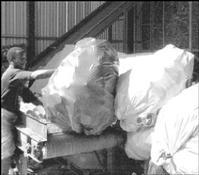By Klao Bell, Staff Reporter
This worker sorts the plastics before sending to the regrinding machine.
JAMAICA'S STREETS, beaches, gullies and open spaces littered with ghastly piles of discarded plastic bottles could be rid of these environmental nuisance if the society were to subscribe to the 'recycle for life' theory.
Bevon Morrison, executive director for the Recycle for Life (RFL), says that the organisation will continue chipping away at the mindset of Jamaicans, until recycling becomes a way of life. For its part, RFL has been collecting and recycling millions of plastic bottles, made from Polyethylene-Terephthalate (PET).
"It took some encouragement to get the support that we now have, but people are getting the message about the importance of recycling. We all should be concerned, as almost every Jamaican uses some item that is packaged in a PET bottle and we have to be concerned about the impact of that one bottle on the environment," Ms. Morrison said.
PET is considered to be environmentally unfriendly for several reasons, including its near indestructability. It takes hundreds of years for the material to break down. Environmentalists have pointed out that for all the PET bottles used, there wouldn't be enough space to store them.
PET bottles are most widely used here, mainly by soft drink companies that use an estimated 70 per cent. But it is estimated that the PET industry uses approximately 245 million bottles per year! This is 50 per cent of the total plastic bottles and containers used in Jamaica!
RFL, which is funded mainly by soft-drink companies, is their attempt at correcting the hazard soft their products' packages pose to the Jamaican environment.
"The value to the soft drink industry is the preservation of the environment and the protection of the brand names. We hate to see out trademarks in the gullies and along the road side," said Mark Roddy, General Manager for Caribbean Bottlers Jamaica Ltd.
Caribbean Bottlers Jamaica Ltd. (Coca-Cola), Pepsi Cola Jamaica Bottling Company Ltd., Jamaica Beverages Ltd. (Busta soft drink) and Jamaica Drink Company Ltd (Bigga Soft Drink), contribute $5 million dollars annually to RFL.
RFL's other partners are some 956 schools, churches, businesses and community based organisations, from which they collect bottles. The bottles are then transported to the Recycling Plant in White Marl, St. Catherine where they are crunched into eggshell like particles called regrind. This regrind is sold to North American purchasers for US$0.04 (J$1.88) per kilogram.
The Denham Town Primary School, collected approximately 150,000 bottles over two years and exchanged the quantities for a computer from RFL.
RFL pays between $8 and $10 for each kilogram of bottles collected. But Ms. Morrison is hoping that its partners will be making much more money from some of the innovative projects on line-up.
"We are going into the production of yam sticks and we're also looking at creating shingles for roofs from PET," Ms. Morrison said.
Studies have shown that Jamaican yam farmers use between 15 and 45 million yam sticks per year. These sticks come from trees that have been chopped down sometimes, solely for that purpose.
At present yam farmers spend between $10 and $15 for a yam stick. Wooden sticks last up to a year, but sticks made from recycled PET should be able to last up to 10 years.
"There will be great opportunity for people who will get a chance to participate in a new industry. These projects will create alternative employment for people who used to do the wrong thing - like cutting down young trees to make yam sticks. The beauty about both the yam stick and the roof production is that when the items have served their purpose, we simply grind them up and recycle them again," said Ms. Morrison with a smile.
Franklyn McDonald, executive director of the National Environment and Planning Agency (NEPA) said "RFL's work is quite meaningful. We need to increase public awareness and the PET recovery rate."

















